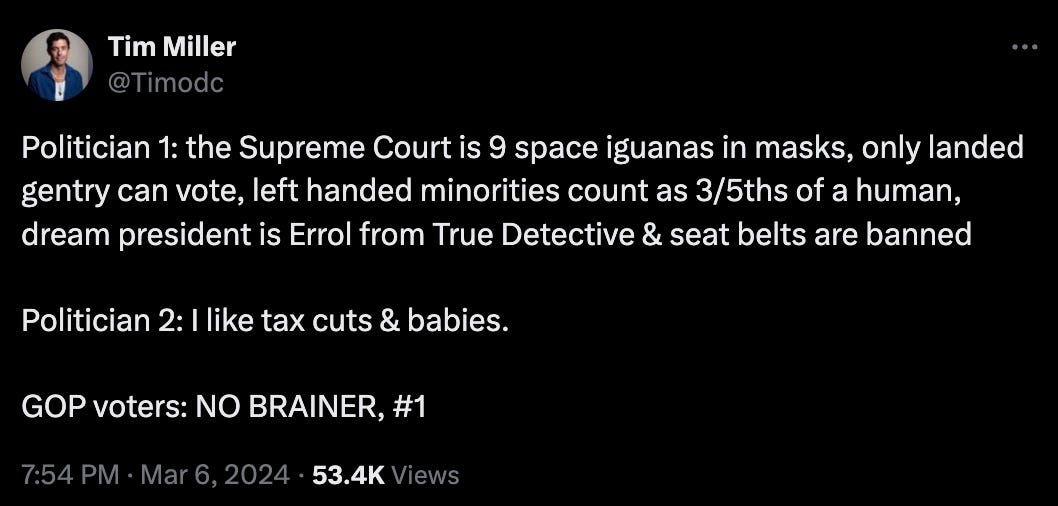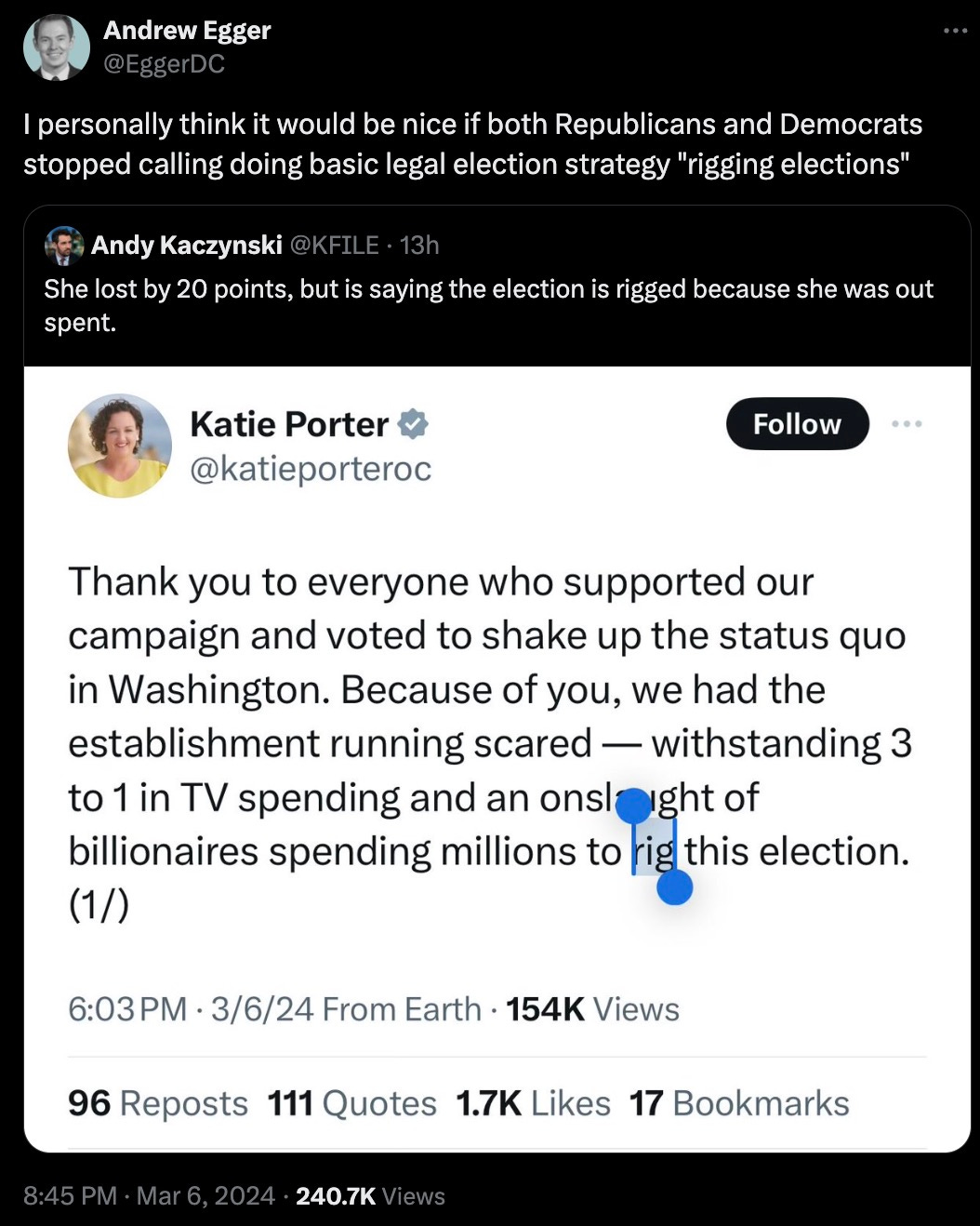‘Time to Unite,’ Say Trump’s Last GOP Holdouts
Plus: GOP donors’ fumbling attempts to box the crazies out of House primaries.
President Biden will give his third State of the Union address this evening at 9 p.m. EST. As he heads into his now-inevitable rematch with Donald Trump, it’ll be an opportunity for him to remind voters of his administration’s accomplishments and a preview of his vision for a second term. The stakes are high, as polls show Biden’s got a lot of ground to make up: Around 38 percent of voters currently approve of the president’s job performance.
Happy Thursday.
The Haley Rearguard Gets in Line
Thunk. Thunk. Thunk.
Those sounds you heard reverberating across Washington yesterday: The last of the Republican establishment thudding dutifully into place behind their presidential nominee, Donald Trump.
Senate Republican Leader (for now) Mitch McConnell led the way in a statement shortly after Nikki Haley dropped out. “It is abundantly clear that former President Trump has earned the requisite support of Republican voters to be our nominee for president of the United States,” McConnell said of the man he once called “practically and morally responsible” for the January 6th attack on the Capitol. “It should come as no surprise that as nominee, he will have my support.”
Sen. Joni Ernst, who chairs the Republican Policy Committee, soon followed suit. “We must beat Joe Biden and get this country back on track,” she tweeted. “Donald Trump has my support.” She was the last member of Senate GOP leadership to do so.
A thunk or two could be heard across the Potomac too: Virginia Gov. Glenn Youngkin endorsed Trump last night, one day after the former president carried 63 percent of the primary vote in his state. “It’s time to unite around strong leadership and policies that grow our great nation,” he tweeted, “not four more years of President Biden.”
These endorsements came just ahead of the Republican National Committee’s meeting scheduled for this weekend, at which Trump’s handpicked candidate, North Carolina party chair Michael Watley, will replace his last handpicked candidate, Ronna McDaniel, as party leader. His daughter-in-law, Lara Trump, will be elected co-chair, with other core loyalists installed in other key positions.
Meanwhile, the RNC will not be voting on a resolution that would have blocked RNC funds from being funneled into Trump’s coffers to pay his mounting legal bills. That draft resolution, which was offered by Mississippi RNC member Henry Barbour last month, failed to receive the requisite support from ten state GOP delegations to force a vote at this weekend’s meeting. “It’s dead,” Barbour told Politico on Tuesday.
Many of the remaining holdouts in the donor class are quickly making their peace with Trump, too. One such person is Eric Levine, a New York litigator who had worked hard to stop Trump in the primaries, giving significant financial support first to Sen. Tim Scott, then to Haley. “I’m from the Reagan Republican party,” Levine said yesterday on MSNBC. “So one thing that’s not gonna happen is I’m not gonna support Joe Biden.” Levine said he’d be focusing his further spending on helping Republicans take back the Senate.
All this makes it even more striking that Haley declined to endorse Trump in her own speech suspending her campaign yesterday—although she did leave the door open to do so later.
“In all likelihood, Donald Trump will be the Republican nominee when our party convention meets in July. I congratulate him and wish him well. I wish anyone well who would be America’s president,” she said. “I have always been a conservative Republican and always supported the Republican nominee. But on this question, as she did on so many others, Margaret Thatcher provided some good advice when she said, ‘Never just follow the crowd. Always make up your own mind.’”
“It is now up to Donald Trump to earn the votes of those in our party and beyond it who did not support him,” she went on. “And I hope he does that. At its best, politics is about bringing people into your cause, not turning them away. And our conservative cause badly needs more people. This is now his time for choosing.”
—Andrew Egger
Speaking of the donor class, Tim has some analysis on how they fared in places where they tried to box particularly crazed House candidates out in Super Tuesday primaries. Spoiler alert—not great:
GOP Donor Class Faceplants (Again)
Republican megadonor Ken Griffin, Walmart heir Rob Walton, and other Trump-skeptical GOP rich guys had a plan: They poured millions of dollars into House races on Super Tuesday in an attempt to prevent additional MAGA “rabble rousers” from winning primaries in deep-red congressional districts.
This is, in theory, a worthwhile effort. We’ve all seen how ungovernable the House Republican Conference has become. Stopping its further degradation by weeding out bad candidates during the primaries makes sense—or, at least, it makes sense if you start from the premise that GOP voters are open to “solutions-oriented” candidates, as Griffin described his made men.
Well, the first test drive of this theory has run its course, and it turns out that millions of dollars are not Kenough to make Republican voters normal again.
Here’s a quick summary of Tuesday’s bill of particulars.
The donors funded two super PACs that have been engaged in this effort: Conservatives for American Excellence and America Leads Action. (Naturally, two separate entities are required to ensure that the maximum number of media consultants get a cut of the ad buys.)
They engaged in five contested primaries, targeting their attack ads at one candidate in each:
In Alabama-1, they opposed Barry Moore.
In North Carolina-6, they opposed Bo Hines.
In North Carolina-8, they opposed Mark Harris.
In Texas-12, they opposed John O’Shea.
In Texas-26, they opposed Brandon Gill.
All in, the groups spent over $6 million—$2 million apiece targeting Gill and Harris and another $2 million spread out among the other three districts, according to FEC data analyzed by NBC News.
Of the five candidates, three won outright (Moore, Harris, and Gill), while O’Shea is heading to a runoff. Only Hines was successfully defeated. That 1-3-1 record isn’t exactly lighting the world on fire, but when you dig into the specifics of their efforts, it looks even worse.
The largest investment was against Brandon Gill, the 30-year-old son-in-law of prominent election denier (and Trump-pardoned felon) Dinesh D’Souza. Gill was the marketing director for D’Souza’s obscene mockumentary that made laughably false claims about how human mules rigged the 2020 election. As part of that effort, Gill launched a fake news website called the DC Enquirer.
GilI, whose only qualification for Congress was having a famous right-wing nut for a relative, ran against people who had appropriate resumes for the job: the mayor of a large town in the district, the former chief-of-staff to a congressman, and a county judge. And despite his ridiculous CV and having millions of dollars spent against him by two super PACs, Gill won by 44 points! Guess the ad wizards should have gone back to the drawing board on that one.
The race in North Carolina’s 8th district was closer. Mark Harris narrowly crossed the 30 percent threshold to avoid a runoff, which might have eventually blocked him from the Republican nomination. Instead, it was another L for the super PACs—and a wild return to prominence for a candidate whose campaign was literally caught fabricating votes in 2018. Unclear how D’Souza and Gill feel about that.
Even in the one district where these groups successfully defeated a candidate, the victory appears pyrrhic. Bo Hines, a perennial loser and MAGA trust fund baby, was defeated (again), but the two candidates who made the runoff are erratic former Rep. Mark Walker and the Trump-endorsed Addison McDowell, whose pinned tweet features a video of him and Trump and a promise to take on the Woke Mob. It’s possible that on the margins Walker or McDowell would be less of a “rabble-rouser” than Hines, but it’s not as if the district is poised to send some mainstream “solutions-oriented” problem solver.
All these losses come on the heels of several other defeats for these very same donors. Griffin recently put a million dollars into Winning for Women Action Fund, a group that spent 6 figures in support of Mazi Pilip’s failed campaign against Rep. Tom Suozzi in the race to replace George Santos and another $5 million into the super PAC for Haley, who dropped out of the race yesterday morning.1
Takeaway for GOP donors thinking of trying this again: Spend as much as you want running normie candidates, but they probably won’t win unless you can find yourself some normie Republican voters. Good luck with that.
—Tim Miller
Catching up . . .
Biden eyes antidote to Americans’ Trump “amnesia” in State of the Union: Axios
Senate GOP braces for long battle to succeed McConnell: Politico
With Sinema out, Democrats see clear path to Arizona Senate win: Axios
Big blue cities are embracing conservative anti-crime measures. Here’s why: Politico
Amid explosive demand, America is running out of power: Washington Post
New Trump super PAC ad attacks Biden over his age: New York Times
Quick Hits: How Many Haley Voters Can Biden Win?
Leading The Bulwark today, Will Saletan has some great Super Tuesday exit-poll analysis of the million-dollar 2024 question: Did Nikki Haley’s campaign drive a wedge into the GOP that Biden can exploit? Here’s a taste:
“In the election for president this November, will you vote for the Republican nominee regardless of who it is?” In the three states that were exit-polled on Tuesday, the percentage of Republicans who answered “No” to that question was 14 in Virginia, 18 in North Carolina, and 25 in California.
Some people in this “No” group are Trump supporters who wouldn’t accept Haley as the nominee. But in two previous exit polls, in New Hampshire and South Carolina, 19 percent of Republicans said they’d be dissatisfied if Trump won the nomination, and nearly all of those dissatisfied voters chose Haley over Trump. By these measures, the percentage of Republicans who are open to ditching Trump might be in the range of 10 to 20.
“Does Donald Trump have the physical and mental health needed to serve effectively as president?” This question was posed in four states. In South Carolina, California, and Virginia, the percentage of Republicans who said no was roughly 15 to 20. In North Carolina, it was half that.
“If Donald Trump were to be convicted of a crime, would you consider him fit to be president?” In the six states where this question was asked, the percentage of Republicans who said no ranged from 19 to 27. Among these “no” respondents, Haley beat Trump by two-to-one or better in every exit-polled state except North Carolina. Again, that suggests a persuadable audience of perhaps 15 to 20 percent.
“Many of these numbers are dismaying,” Will writes. “They illustrate the extent to which the Republican party, in Trump’s thrall, has lost its grip on reality, morals, and civic responsibility. But they also reveal some targets of opportunity. A significant chunk of Republicans—somewhere between 5 and 30 percent, depending on the question—is open to information and persuasion about Trump’s lies, his crimes, his corruption, and his attempts to seize power.”
Cheap Shots
Correction (March 9, 2024, 10 a.m. EST): As originally published, this sentence suggested that Griffin gave money directly to the campaign of Mazi Pilip; it has been edited to reflect that he instead gave money to a super PAC that supported Pilip.









In a bit of a mood this morning, so buckle up.
Haley: "At its best, politics is about bringing people into your cause, not turning them away. And our conservative cause badly needs more people. This is now his time for choosing."
Oh, piss off, Nikki. The cause of the modern GOP is not a conservative cause. The modern GOP's cause is to *burn everything down* in the name of an obese, demented adjudicated rapist and insurrectionist. That's what the base wants: chaos, destruction, and revenge. And Trump's going to give it to them should he win.
Let's not be under any delusions about what the modern GOP has chosen to be. There are no better angels to appeal to. There are no principles at work here. As JVL has often said, "Forever Trump".
“It should come as no surprise that as nominee, he will have my support.”
Yes, Mitch. It is no surprise. We have known for a long time that you are a man completely without honor.